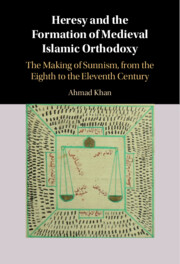 Heresy and the Formation of Medieval Islamic Orthodoxy
Heresy and the Formation of Medieval Islamic Orthodoxy from Part I - History of Orthodoxy
Published online by Cambridge University Press: 06 April 2023
This chapter provides a comprehensive examination of how hostility towards Abu Hanifa evolved over three centuries among the proto-Sunni traditionalist network. It argues that the construction of heresy and orthodoxy depended on the circulation of discourses of heresy among textual communities. Transregional proto-Sunni traditionalists developed informal ways to regulate, discipline, and shape conceptions of orthodoxy and heresy. The chapter brings into sharp focus the key agents of proto-Sunni traditionalist orthodoxy: its texts, scholars, and figures who articulated and promulgated discourses of heresy. We can now discern a mature and virulent discourse of heresy among an influential network of proto-Sunni traditionalists seeking to malign, exclude, and marginalise Abu Hanifa and his followers from the proto-Sunni traditionalist conception of orthodoxy. In the tenth century, however, we can observe some attempts by proto-Sunni traditionalists to depart from the network’s emerging consensus and adopt a more accommodating tone towards Abu Hanifa and his followers, which marks the beginning of a broader conception of Sunni orthodoxy.
To save this book to your Kindle, first ensure [email protected] is added to your Approved Personal Document E-mail List under your Personal Document Settings on the Manage Your Content and Devices page of your Amazon account. Then enter the ‘name’ part of your Kindle email address below. Find out more about saving to your Kindle.
Note you can select to save to either the @free.kindle.com or @kindle.com variations. ‘@free.kindle.com’ emails are free but can only be saved to your device when it is connected to wi-fi. ‘@kindle.com’ emails can be delivered even when you are not connected to wi-fi, but note that service fees apply.
Find out more about the Kindle Personal Document Service.
To save content items to your account, please confirm that you agree to abide by our usage policies. If this is the first time you use this feature, you will be asked to authorise Cambridge Core to connect with your account. Find out more about saving content to Dropbox.
To save content items to your account, please confirm that you agree to abide by our usage policies. If this is the first time you use this feature, you will be asked to authorise Cambridge Core to connect with your account. Find out more about saving content to Google Drive.